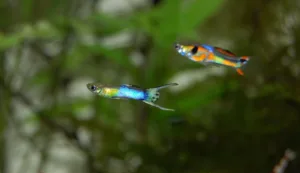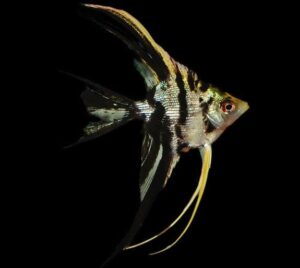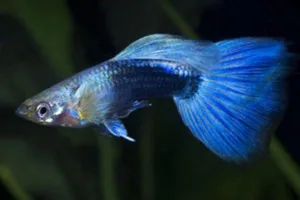Guppies are among the most popular and beloved freshwater fish species kept in aquariums around the world. Known for their vibrant colors and lively personalities, guppies can bring a lot of joy to aquarium enthusiasts. However, guppies are not without their vulnerabilities, and there are common reasons why they may succumb prematurely. In this article, we’ll explore the top five reasons why guppies often die and offer tips on how to keep your aquarium pets healthy and thriving.
1. Poor Water Quality: A Silent Killer
One of the leading causes of guppy mortality is poor water quality. Guppies are highly sensitive to changes in their aquatic environment, and when water quality deteriorates, it can have severe consequences. Common factors that contribute to poor water quality include:
- Ammonia: Ammonia is produced by fish waste and decaying organic matter. High levels of ammonia are toxic to guppies and can cause stress, illness, and death.
- Nitrite: Nitrite is another toxic compound that can accumulate in aquariums. It’s a product of the breakdown of ammonia by beneficial bacteria. High nitrite levels can damage guppy gills and lead to nitrite poisoning.
- Nitrate: While nitrates are less toxic than ammonia and nitrite, high nitrate levels can still stress guppies and lead to health problems.
- Low Oxygen Levels: Guppies, like all fish, require oxygen to survive. Inadequate oxygen levels can lead to suffocation and a weakened immune system.
- pH Fluctuations: Rapid changes in pH can stress guppies and make them more vulnerable to diseases.
To maintain good water quality, you should:
- Regularly test the water parameters, especially ammonia, nitrite, nitrate, and pH levels.
- Perform routine water changes to dilute and remove harmful compounds.
- Use a good filtration system to remove waste and promote beneficial bacteria growth.
- Avoid overcrowding the aquarium, which can lead to a faster buildup of waste.
2. Overfeeding: Too Much of a Good Thing
Feeding your guppies is a pleasurable part of fishkeeping, but overfeeding can lead to several problems, including guppy fatalities. Overfeeding can result in:
- Digestive Issues: Guppies have small stomachs, and overfeeding can cause bloating, constipation, and swim bladder problems.
- Water Pollution: Excess food that goes uneaten will break down and release toxins into the water, leading to poor water quality.
- Obesity: Just like in humans, overeating can lead to obesity in guppies, which can contribute to a host of health issues.
To avoid overfeeding, follow these guidelines:
- Feed your guppies in moderation. They typically need to be fed 2-3 times a day, with only as much as they can consume in a couple of minutes.
- Remove any uneaten food from the tank to prevent water pollution.
- Provide a varied diet, including high-quality flakes, pellets, and occasional treats like live or frozen foods.
3. Disease and Parasites: Hidden Threats
Guppies, like all living creatures, are susceptible to diseases and parasitic infections. Some common health issues that can afflict guppies include:
- Fungal Infections: Fungal infections can manifest as white or cottony growths on the guppy’s body, fins, or gills.
- Bacterial Infections: Bacterial infections can cause symptoms like fin rot, red sores, and general lethargy.
- Parasites: Parasites, such as gill flukes, skin flukes, and ich, can infest guppies and lead to a range of health problems.
- Viral Diseases: Some guppies may be carriers of viral diseases, which can pose a threat to the entire aquarium population.
To protect your guppies from diseases and parasites:
- Quarantine new fish before introducing them to your main tank to ensure they are not carriers of any infections.
- Maintain good aquarium hygiene, which includes regular water changes, cleaning the substrate, and rinsing filter media.
- If you suspect a disease outbreak, isolate and treat the affected guppies promptly to prevent the spread of illness.
- Consult with a veterinarian or experienced aquarist for advice on disease prevention and treatment.
4. Stress: The Silent killer
Stress can be a silent killer in the aquarium, as it weakens a guppy’s immune system, making it more susceptible to diseases and ultimately leading to death. Common stressors for guppies include:
- Overcrowding: Keeping too many fish in a small space can lead to territorial disputes, aggression, and stress.
- Sudden Changes in Water Parameters: Rapid changes in temperature, pH, and water hardness can stress guppies. Gradual acclimatization is crucial when introducing new water or fish to the tank.
- Aggressive Tankmates: Some aquarium fish can be aggressive and harass guppies. Ensure you choose compatible tankmates.
- Poor Habitat Conditions: Inadequate hiding spots, poor water circulation, or inappropriate decorations can create a stressful environment for guppies.
To reduce stress in your aquarium:
- Provide ample hiding spots and plants to create safe spaces for guppies to retreat to.
- Select tankmates that are compatible with guppies in terms of size, temperament, and water requirements.
- Maintain stable water conditions and perform gradual changes when necessary.
5. Inbreeding: A Genetic Conundrum
Many guppies available in the aquarium trade have been extensively bred for specific traits like vibrant colors and unique fin shapes. This selective breeding can lead to inbreeding, which weakens the genetic diversity of the population. Inbreeding can result in guppies that are more susceptible to diseases and have reduced longevity.
To address the issue of inbreeding:
- Consider sourcing your guppies from reputable breeders who prioritize genetic diversity and overall health.
- Avoid purchasing fish from pet stores that may not prioritize the genetic health of their guppies.
In conclusion, guppies are delightful aquarium fish, but they require proper care and attention to ensure their well-being. By maintaining good water quality, avoiding overfeeding, preventing and treating diseases, reducing stressors, and addressing genetic diversity, you can significantly increase the chances of keeping your guppies healthy and thriving in your aquarium. Remember that successful guppy care relies on a combination of knowledge, observation, and dedication.
Other Common Guppy Questions
- Will Guppies Eat Their Fry?
- Will Guppies Eat Shrimp?
- Where Are Guppies From? The Origin Story
- Can I Keep Guppies And Mollies Together?
- Can I Keep Guppies In A Fish Bowl?
- Can I feed Guppies Betta Food?
- Can I Keep Guppies With Angelfish?
- Can I Keep Guppies With Shrimp?
- Can I put Guppies With Goldfish
- Can I put Guppies With a Betta?
- Are Guppies Saltwater Fish?
- Are Guppies Top Swimmers
- Are Guppies Fin Nippers: Unraveling the Truth
- Are Guppies Easy To Take Care Of
- Are Guppies Tropical Fish: Everything You Need to Know
- Are Guppies Aggressive? Unveiling the Complex Nature of These Popular Aquarium Fish
- Are Guppies Schooling Fish? Unveiling the Fascinating Social Behavior of Guppy Fish










